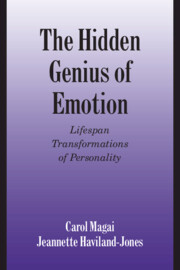Book contents
- Frontmatter
- Contents
- Preface
- Part I Introduction
- 1 Challenging the Prevailing View
- 2 Affect, Human Development, and Dynamic Systems
- Part II Emotion as the Integrative Link in Social and Personality Development
- Part III Emotion as the Link in Intellectual Work
- Part IV Emotion as the Link in Therapeutic Behavior
- Part V Presenting a New View
- Appendix
- References
- Subject Index
- Author Index
- Cambridge Cultural Social Studies
2 - Affect, Human Development, and Dynamic Systems
Published online by Cambridge University Press: 25 June 2009
- Frontmatter
- Contents
- Preface
- Part I Introduction
- 1 Challenging the Prevailing View
- 2 Affect, Human Development, and Dynamic Systems
- Part II Emotion as the Integrative Link in Social and Personality Development
- Part III Emotion as the Link in Intellectual Work
- Part IV Emotion as the Link in Therapeutic Behavior
- Part V Presenting a New View
- Appendix
- References
- Subject Index
- Author Index
- Cambridge Cultural Social Studies
Summary
Historically, developmental theory has been captivated by two central romances – the notion of “early experience” (pedogenesis) and the doctrine of “continuity.” Like most romances, both theories attempt to simplify lives and to make them a mythical whole, sometimes a heroic myth. And like most romances, there is a certain truth to them, but also a loss of complexity and depth that can border on untruth or at least limit the romance to a special case. To prepare the reader for our approach of examining lives with a new look at their complexity and depth, we need to present a short history of these compelling romances and then open the field of possibilities. This exercise will involve considering theories of complexity and chaos or dynamic systems and will require that the reader have some familiarity with the new vocabulary. Our analysis does not rely upon the mathematical intricacies of these new approaches; it, however, often relies on the hypotheses and explanations that are generated.
Both psychoanalytic models of development as well as contemporary attachment theory follow the early experience and continuity theories. In classic psychoanalytic theory, early experience and continuity through repetition are paramount. Personality is largely formed by the age of five, and early conflicts are played out successively in later relationships, with the individual in thrall to an unconscious but headstrong repetition compulsion. In attachment theory, continuity and early experience are required. Infants form highly specific, qualitatively differentiated attachments to primary caregivers.
- Type
- Chapter
- Information
- The Hidden Genius of EmotionLifespan Transformations of Personality, pp. 27 - 52Publisher: Cambridge University PressPrint publication year: 2002

